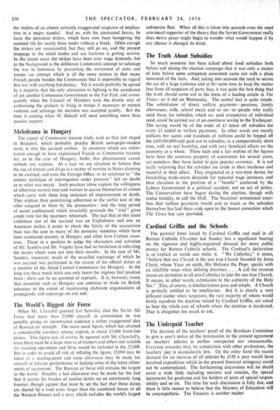Melodrama in Hungary
The aspect of Communist treason trials, such as that just staged in Budapest, which probably puzzles British newspaper-readers most, is why the accused confess. In countries which are unfor- tunate enough to have experienced Fascist or Communist tyranny (or, as in the case of Hungary, both), this phenomenon causes nobody any surprise. As a race we are reluctant to believe that the use of torture and drugs is a matter of routine in States claiming to be civilised, and even the Foreign Office, in its reference to "the sinister technique of interrogation under pressure" left no doubt as to what was meant. Such practices alone explain the willingness of otherwise normal men and women to accuse themselves of crimes which carry with them long sentences of imprisonment or death. They explain their painstaking adherence to the verbal text of the roles assigned to them by the prosecution ; and the long period of secret confinement which invariably proceeds the " trial " gives ample time for the necessary rehearsals. The fact that in this latest exhibition one of the accused was an Englishman and one an American makes it easier to check the falsity of the accusations than was the case in many of the domestic vendettas which have been conducted recently in Hungary and other Iron Curtain coun- tries. Those in a position to judge the characters and activities of Mr. Sanders and Mr. Vogeler have had no hesitation in ridiculing the stories which were put into their mouths. In the case of Mr. Sanders, moreover, much of the so-called espionage of which he was accused was performed in the course of his official duties as a member of the Allied Control Commission for Hungary. In the long run these mock trials can only harm the regimes that produce them ; there can be no question of reprisals. It is, however, ironic that countries such as Hungary can continue to trade on British tolerance to the extent of maintaining elaborate organisations of propaganda and espionage on our soil.


































 Previous page
Previous page